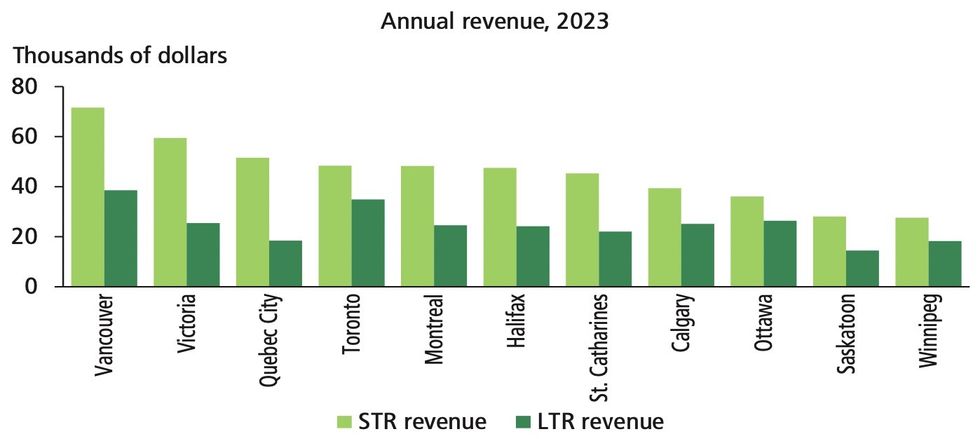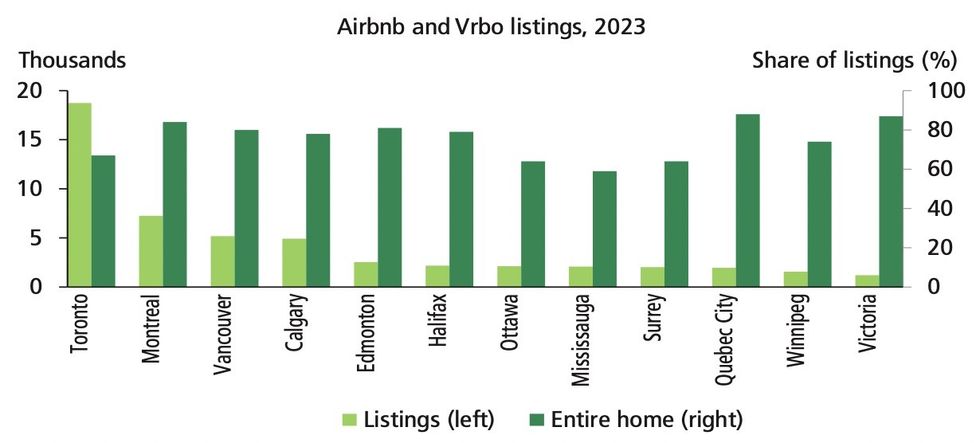Placing restrictions on short-term rentals could ease housing supply constraints and reduce upward pressure on rents, effectively helping to alleviate Canada’s housing crisis.
The rise of such platforms, like Airbnb and Vrbo, has had a "significant" impact on both the affordability and availability of housing, as thousands of would-be long-term rental units are instead offered for short-term accommodation.
The revelation is courtesy of a new report from Desjardins' Kari Norman, Economics Document Production Specialist, and Randall Bartlett, Senior Director of Canadian Economics.
The increased popularity of short-term rentals has been driven in part by the fact that investors stand to make substantially more income; in Victoria, for example, the annual revenue for a long-term rental in 2023 was roughly $23,000. For a short-term rental, it was nearly $60,000.

According to data from AirDNA, there were 235,000 unique active short-term rental listings on Airbnb and Vrbo across Canada over the last 12 months. The figure is equivalent to 4.9% of Canada’s long-term rental units, or 1.4% of the total housing stock.
Meanwhile, the national rental vacancy rate was 1.9% in 2022, well below the long-term average of 2.7% and the "balanced" market rate of 3%. As Norman and Bartlett note, when the vacancy rate is above 3%, rents tend to flatten and even fall. When it’s below 3%, rents rise.
"For renters right now, there's a crisis in availability with vacancy rates in most major markets well below the balanced market rate of 3%. There's also a crisis in affordability, with asking rents increasing almost 10% this year," Norman told STOREYS.
The economists delved into a slew of studies conducted around the world — including in New York City, Los Angeles, Barcelona, and Canada — and found that neighbourhoods with a high prevalence of short-term rental listings experience faster rising rents and a lower vacancy rate for long term tenants, Bartlett said.
As such, short-term rentals are "likely contributing to the erosion of housing affordability in Canada and around the world."
To remedy the issue, governments should introduce public policies that would restrict short-term rentals. But, rather than sweeping regulations, such enforcement should be focused on commercial investors who purchase properties to list full-time, rather than homeowners who rent out a spare bedroom in their principal residence or who list their entire home while they’re on vacation themselves. It is only the former group whose actions remove units from the long-term rental market, worsening Canada’s housing crisis.
Policies that have been introduced with some success include Toronto requiring short-term rental hosts to obtain a licence and capping the number of days an entire home can be rented out, and Whistler restricting short-term rentals to properties zoned for tourists.
Some Ontario cities have instituted additional taxes for short-term stays, while Quebec, British Columbia, and Alberta collect comparable taxes or levies at the provincial level. However, the economists note that such taxes are unlikely to have a significant impact the housing market, and may actually incentivize governments to permit more short-term rentals.
Similarly, measures introduced in the Fall Economic Statement intended to crack down on illegal short-term rentals, including preventing owners from making income tax deductions on such properties, are no doubt helpful, but are unlikely to “level the playing field” between short and long-term rentals in a meaningful way,
To Bartlett, the measures that really move short term rental units back into the hands of long-term tenants are those that limit short-term rentals to primary residences.

When such a restriction was recently implemented in Vancouver, an estimated 800 housing units were returned to the long-term rental market, the equivalent of roughly three high-rise condos which would have taken years to build. Shortly thereafter, Finance Minister Chrystia Freeland estimated that 30,000 housing units could be added back to the market in Vancouver, Toronto, and Montreal if restrictions on short-term rentals were put in place.
“Restrictions on short term rentals bring units back into long-term housing virtually overnight,” Bartlett told STOREYS.
“Canada is in a housing crisis. There’s no single magic solution that's going to fix everything. It will ultimately be a combination of many things that bring housing into an affordable situation. But [restricting short-term rentals] is one component that can really have an impact quickly. Particularly when it takes such a long time from start to finish to build a new condo, a new rental tower, or a new housing development.”





















